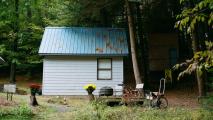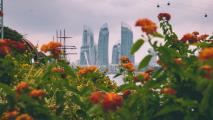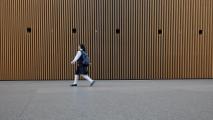Field: Urban Living
New York City greenlights congestion pricing
Here’s how New York City's congestion pricing is expected to improve traffic, air quality, and public transit.
“Stone wool”: lava-based material is more efficient, lasts longer than most insulation materials
Stone wool, a lava-based material, is more efficient and lasts longer than today's most common insulation materials.
Three ways your environment affects your intelligence
These examples underscore the importance of environmental regulation and policies; otherwise, we might just be throwing away our intelligence.
Ever-larger cars and trucks are causing a safety crisis on US streets
Deadly traffic incidents have declined in most developed countries in recent years. But in the U.S. they’re becoming more common.
How building more backyard homes, granny flats, and in-law suites can help alleviate the housing crisis
Accessory dwelling units, or ADUs, are sometimes called “granny flats,” “backyard homes,” “in-law suites,” or “backyard cottages.”
The grid isn’t ready for 300 million EVs by 2030. Here’s how to fix it.
There were 16.5 million electric vehicles on the world’s roads in 2020 - this is expected to rise to 300 million by 2030.
Nature-based solutions are cleaning up cities
Nature-based solutions can be radical — think covering a highway with a park — but offer meaningful ways to address pollution.
Shutting down nuclear power could increase air pollution
If nuclear reactors are retired, polluting energy sources that fill the gap could cause more than 5,000 premature deaths.
3D printing promises to transform architecture forever
Large-scale additive manufacturing, like 3D printing, involves building objects one layer at a time, transforming architecture as we know it.
Open-source map could empower pedestrians in car-filled cities
Most cities don’t map their own pedestrian networks. Now, researchers have built the first open-source tool to let planners do just that.
Self-sufficient “microgrids” could save you from power grid emergencies
Centralized power systems rely on large power plants and transmission grids, but microgrids are self-sufficient.
LA’s on-demand vans charge just $1 per ride
Los Angeles has launched Metro Micro, an on-demand public transportation service that charges just $1 per ride.
Could 3D printing help solve the US housing crisis?
3D printing could help solve the nation’s housing crisis, as it's cheaper, faster, and more sustainable than conventional construction methods.
How Singapore’s “Garden City” vision fused nature and urban design like nowhere else
Singapore's green thumb developed from its recent history. Its small size meant that staying independent required protecting its resources.
Watch: Robotic window cleaners take to the sky
In a bid to shake up the industry, two Israeli companies will soon deploy robot window cleaners to cities around the world.
Coastal cities created 40 Manhattans’ worth of new land since 2000
The first global assessment of land reclamation found that people have added 900 square miles of land to Earth’s coasts this century.
Extreme heat is changing habits of daily life
Researchers found that extreme temperatures actually have a much larger effect on human activity than the previous estimations.
Cosmic dust from Venus is inspiring new air pollution-busting technology
Inspired by chemistry observed on the surface of Venus, researchers produced a synthetic material that could improve air quality.
Tokyo wants to build a future-proof city. Here’s how.
Tokyo’s municipal government has announced plans to build a high-tech, sustainable city on reclaimed land in its bay area.
What can cities do to survive extreme heat?
Urban heat waves are getting worse, but better data and timely government action could make them less deadly.
A green trifecta: how a concrete alternative can cut emissions, resource use, and waste
Building materials and construction generate about 20% of global greenhouse gas emissions. What if there was an alternative?
Kid-friendly superblocks are a way for residents to reclaim their streets
A superblock covers several neighbourhood blocks reserved for shared use by cyclists, walkers, and residents.
New “risky” playground could make kids anti-fragile
A new playground in Melbourne’s Southbank is the work of artist Mike Hewson, who introduces "risk" back into play.
Your house could become a rechargeable cement battery. Here’s how.
Rechargeable cement batteries could allow for whole sections of multi-storey buildings to be made of functional concrete.
Solar geoengineering could cool Earth, but some regions might continue warming
Some governments might try to “geoengineer” the planet by spraying substances into the upper atmosphere to reflect sunlight away from Earth.
Does turning the air conditioning off when you’re not home actually save energy?
Which is more efficient: running the air conditioning all day long, or turning it off during the day when you’re not there to enjoy it?
Stanford engineers warn that electric car charging could crash a grid powered by renewable energy
Most electric car charging is done at night. A grid powered mostly by renewable energy might not be able to meet demand.
Walking to school is more likely to keep kids active as they age
Children who walk or bike to school at a young age are more likely to continue the habit as they age, a new study shows.
“Up to 2.4 million new apartments” legalized by bipartisan California legislation
Millions of new apartments in commercial areas and near transit have been legalized by new California laws just signed by Governor Gavin Newsom.
This start-up is recycling abandoned wooden homes in Baltimore
The Baltimore Wood Project salvages wood from buildings to repurpose and resell locally to create a circular economy.
Electric school buses are taking students back to school
Can electric school busses bring cleaner air and lower maintenance costs to school districts across the country?
Debunking stereotypes about mobile homes could make them a new face of affordable housing
People see manufactured housing parks as problems. We recognize them as part of the solution to housing crises.
5 ways to cope with increasingly intense heatwaves
Heatwaves in Japan and Italy reached record-breaking temperatures in June. How can humans cope with these dangerous conditions?
You can ride this “flying” electric ferry in 2023
Stockholm is piloting a “flying” electric ferry that’s expected to cut commute times in half and make public transportation more sustainable.
Digital nomad: why work from home if you can work from anywhere in the world?
Digital nomad visas make it easier than ever for remote workers to live in foreign countries for extended periods of time.
Satellites zoom in on cities’ hottest neighborhoods
In “micro-urban heat islands,” communities can experience heat wave conditions well before officials declare a heat emergency.
Geopsychology: Your personality depends on where you live
Scientists in the relatively new field of “geopsychology” are seeing links between personality and location.
Longtermism’s perspective on humanity’s past, present, and future
If we manage to avoid a large catastrophe, we can see ourselves as living at the early beginnings of human history.
See the world’s first floating city: OCEANIX Busan
If the world's first floating city is a success, other coastal metropolises could use it as a blueprint for adapting to rising sea levels.
The next big disruption is coming: How cities can prepare for flying cars
Urban Aerial Mobility - or 'flying cars' - could present a more flexible way for cities to invest in future infrastructure.
Why Starting New Cities Isn’t a Quick Fix for the Housing Crisis
American towns and cities are no longer able to adapt to new residents. Is building new cities really the solution to this problem?
These innovative projects are tackling homelessness around the world
It’s been estimated that at least 150 million people, which is about 2% of the world’s population, are homeless.
Barcelona’s plan to “pedestrianize” its downtown could transform our cities
A new method for evaluating the potential for superblock transformations in different cities could increase their rollout across the globe.
This new “levitating” Chinese train will be the fastest in the world
It would only take 2.5 hours to travel from Beijing to Shanghai, a journey of more than 1,000 km or 620 miles.
Internet-connected “smart” traps help cities combat rats
Internet-connected rat traps are bringing rodent control into the 21st century, helping cities leverage data in the battle against rats.
Paris plans to be completely cyclable by 2026
France is investing a total of 250 million euros ($290 million) to make the city of Paris entirely bikeable.
Are urban villages the solution to sprawl?
Urban sprawl leads to a number of modern problems. Urban villages, with their focus on walkability and local services, may be a solution.
How slime molds can design efficient subway networks without human help
A new computer models shows how slime molds may design efficient subways without our help.
See a futuristic flying car’s first untethered flight
A prototype of a futuristic flying car developed by Bellwether Industries has completed its first untethered test flights.
Paris to make the Seine River swimmable for the Olympics
Paris’ plan to make its iconic Seine River swimmable for the 2024 Summer Olympics could help other cities clean up their own waterways.
The shift to remote work is helping solve the housing shortage
Converting empty office buildings into apartment units through “adaptive reuse” is helping address the housing shortage.
Free WiFi in apartment buildings helps close the digital divide
The EducationSuperHighway nonprofit plans to narrow the digital divide in America by deploying free WiFi networks in apartment buildings.
Foldable electric cars join emergency response fleet in Israel
Emergency medical service organization United Hatzalah is adding foldable electric cars to its fleet to speed up its response times
Startup is turning abandoned houses into affordable homes
The startup nonprofit Parity is renovating abandoned houses in Baltimore and then selling them to locals at affordable prices.
“Agrihood” puts a farm in the center of Silicon Valley housing
An “agrihood” under construction in Santa Clara, CA, will give low-income residents access to cheap produce grown onsite.
Cyclists’ stress levels could improve road safety
To improve road safety, a new study suggests we measure cyclists’ stress levels as they navigate city streets to identify dangerous areas.
Is it time for America to bring back the boarding house?
A revival of the boarding house — popular in the 1800s, banned by modern zoning — could help solve America’s affordable housing woes.
Series|
Hard Reset
Do buildings have to be permanent?
Modular construction involves transporting prefabricated buildings and connecting them on-site. It’s like LEGOs on steroids, and it could transform our cities.
Series|
Just Might Work
The case for drinking treated wastewater. (Yes, from the toilet.)
Concern over droughts and water pollution have ignited a unique solution for preserving one of our most vital resources — advanced wastewater treatment for human consumption, also known as direct potable reuse.
How Spin is making its e-scooter service more accessible
In partnership with Ford
Spin, a micromobility provider, is using AI to help make e-scooters safer and city streets more accessible to all residents.
Transloc is using big data to create a more efficient public transit system
In partnership with Ford
Cities across the U.S. are creating on-demand van transportation systems that work like Uber, but for the cost of a bus fare.
Singapore’s solar concentrator funnels daylight underground
This compact solar concentrator could be the perfect daylight harvesting device for Singapore’s underground spaces.
Are ancient city grids still the best way to build?
In partnership with Ford
Although their roots date back thousands of years, city grids are starting to inspire modern urban planners. Is the grid still the best way to build?
The future of cities starts with transportation equity
In partnership with Remix
People in low-income areas have a harder time accessing jobs, schools, and health care. How can we make public transit more equitable?
Reclaiming city spaces with “tactical urbanism”
In partnership with Ford
From guerilla gardening to pop-up parks, tactical urbanism is catching the world by storm.
Futuristic city will be a testbed for robots & autonomous cars
Toyota has broken ground on Woven City, a futuristic city prototype where the technologies of tomorrow can be tested en masse.
This urban park used to be an airport runway
To provide cities with more green spaces, designers turned a former airport runway into an urban park and an abandoned mall into a recreational lagoon.
Google’s Tree Canopy Lab is helping LA cool down
Google’s new Tree Canopy Lab uses AI and aerial photography to combat the urban heat island effect by showing a city exactly where it could use more trees.
Green space at daycare gives city kids an immune boost
Adding a green space to an urban daycare’s playground can boost a child immune system after just 28 days.
Minecraft’s urban planning AI could help design future cities
AIs design entire settlements in an annual Minecraft competition that could reveal uses for the tech in real-world urban planning.
Smart home devices can now track your health
Smart home technology can provide insight into residents' health by monitoring temperature, vision, and body chemistry.
Life, liberty, and the pursuit of internet
Should internet access be a human right? 42 million Americans still don’t have reliable access, but the pandemic has kickstarted initiatives to change that.
‘Seeing’ the world through smell
Kate McLean wants you to navigate your world by its smells, and is creating unique maps of cities by their scents.
This urban farm in Dallas grows financial and social opportunities for residents
In partnership with Stand Together
A once impoverished and isolated neighborhood in South Dallas is now flourishing thanks to Bonton Farms.
Series|
Catalysts
How urban farming saved a Dallas community
In partnership with Stand Together
In the impoverished community of Bonton, it takes a three-hour bus ride just to reach the nearest grocery store. But the neighborhood is now home to one of the largest urban farms in the US - offering jobs, nutrition programs, and more.
Floating farm takes sustainable agriculture to the next level
Inspired by the food shortages witnessed in New York City following Hurricane Sandy, this husband and wife team came up with the idea for a sustainable farm that floats on the sea.
Will Hunt finds humanity underground
In Will Hunt’s book Underground, the journalist and "urban explorer" details his expeditions through caves, mines, tunnels, catacombs, and sewer systems around the world and the depths of the information he's found.
The dark toll of light pollution
Bird populations are paying the price for our electric lights. These volunteers are working to change that.
Getting aerial ridesharing off the ground
It’s been the ultimate futuristic dream for decades: flying cars! But now, the future finally has a deadline. At least to start, it will land in the form of a small air taxi operated by Uber, not something you’ll park in your garage.
Series|
Future of Cities
Futuristic Copenhagen architecture builds on water
The innovators of Copenhagen architecture are pioneering new solutions to urban living challenges, from floating parks to man-made islands.
Series|
Future of Cities
Copenhagen turns trash into ski slopes
Humans throw away 3.5 million tons of waste every day. Copenhagen is taking waste management to new heights (literally) to deal with trash from residents, making it the sustainable city of the future.
The future of micromobility in Africa
In Addis Ababa, Ethiopia, improvements to infrastructure shift focus from cars to micromobility. The city’s transportation plan calls for hundreds of kilometers of bike lanes and pedestrian pathways for increased safety.
Series|
Future of Cities
The sustainable city of the future: Copenhagen, Denmark
By 2050, 70% of the world’s population will live in urban areas (up from 50% now). With the climate crisis worsening, how can we support this urban trend in a sustainable way?
Paving the way with recycled roads
The world is facing a massive build up of waste. But this solution of recycled roads may pave the way for a cleaner future.
Merging nature and sustainable design: An interview with Daan Roosegaarde
From towers that create pockets of clean air to a luminescent bike path that glows like children's ceiling stars, Daan Roosegaarde's entire practice is centered around the beauty of living with nature and removing pollution from urban life.
The world's first floating dairy farm
In the search for more sustainable methods of global food production, one couple in the Netherlands is taking an unconventional approach: they have become the operators of the world's first and only floating dairy farm.
5 fascinating ways humans are adapting to cities
There’s a global transformation happening - millions of people are migrating to cities from the countryside.
This week in ideas: Why D.A.R.E. didn't work, the future of cities, and is love actually actually good?
Our weekly take on the best stuff from around the web.






















































































